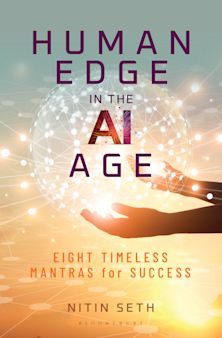- Home
- ACADEMIC
- Computer & Information Science
- Privacy in the Age of Big Data
Privacy in the Age of Big Data
Recognizing Threats, Defending Your Rights, and Protecting Your Family
Privacy in the Age of Big Data
Recognizing Threats, Defending Your Rights, and Protecting Your Family
You must sign in to add this item to your wishlist. Please sign in or create an account
Description
Digital data collection and surveillance gets more pervasive and invasive by the day; but the best ways to protect yourself and your data are all steps you can take yourself. The devices we use to get just-in-time coupons, directions when we’re lost, and maintain connections with loved ones no matter how far away they are, also invade our privacy in ways we might not even be aware of. Our devices send and collect data about us whenever we use them, but that data is not safeguarded the way we assume it would be.
Privacy is complex and personal. Many of us do not know the full extent to which data is collected, stored, aggregated, and used. As recent revelations indicate, we are subject to a level of data collection and surveillance never before imaginable. While some of these methods may, in fact, protect us and provide us with information and services we deem to be helpful and desired, others can turn out to be insidious and over-arching.
Privacy in the Age of Big Data highlights the many positive outcomes of digital surveillance and data collection while also outlining those forms of data collection to which we may not consent, and of which we are likely unaware. Payton and Claypoole skillfully introduce readers to the many ways we are ‘watched,’ and how to adjust our behaviors and activities to recapture our privacy. The authors suggest the tools, behavior changes, and political actions we can take to regain data and identity security. Anyone who uses digital devices will want to read this book for its clear and no-nonsense approach to the world of big data and what it means for all of us.
Table of Contents
Chapter 1. The Intersection of Privacy, Law, and Technology
Tech Section I. Ground Zero: Your Computer and the Internet
Chapter 2.Your Computer is Watching You
Chapter 3.How Government Follows Your Electronic Tracks
Chapter 4. Chased Online by Criminals and Snoops
Chapter 5.Just Hanging Our Online . . .
Chapter 6.The Spy in Your Pocket
Tech Section II. Risks in the Streets
Chapter 7.Cameras Everywhere
Chapter 8.When Your Car is Just Another Computer
Chapter 9.When Your Own Body Gives You Away
Chapter 10.DNA and Your Health Records
Tech Section III.Home is Where the Heart (of Surveillance) Is
Chapter 11.Home Sweet Home: Spies in Your Living Room
Chapter 12.Risks of Computer and Phone Networks
Tech Section IV.Where Do We Go From Here?
Chapter 13.The Future of Technology and Privacy
Chapter 14.Laws and Regulations That Could Help Preserve Privacy
Product details
| Published | 16 Jan 2014 |
|---|---|
| Format | Ebook (PDF) |
| Edition | 1st |
| Extent | 276 |
| ISBN | 9798216259893 |
| Imprint | Rowman & Littlefield |
| Publisher | Bloomsbury Publishing |
About the contributors
Reviews
-
[Data] tracking can always be used by nefarious individuals or groups, but it is part of the way we live now. It is as though highways were also fraught with piracy. That’s the kind of thing we’re dealing with. This is the discussion of the era, and this book is smack in the middle of it.
Jon Stewart, The Daily Show
-
Former White House Chief Information Officer Payton and lawyer Claypoole, authors of Protecting Your Internet Identity, team up again to produce this quick and easy overview of data collection and its relevance in our everyday lives. The authors guide readers through the many ways our personal information is collected and used in today’s society. They are quick to point out the beneficial aspects of technological advancements in commercial, private, and government settings. However, any collection of personal data is susceptible to malicious use. The authors go on to elaborate on the everyday possibilities of hacking, wiretapping, and other big data strategies by marketers and cybercriminals. Most alarming are the implications of data mining for everyday citizens: cybercriminals can and will steal any information, through government or commercial enterprises. Payton and Claypoole provide practical tips and tools for protecting personal data throughout making this a perfect beginner’s guide for anyone looking to stay informed.
Publishers Weekly
-
Payton and Claypoole intend this book as an overview of the threats facing private citizens in the era of cloud computing and big data. Discussions of privacy in this time take as their departure point the problematic nature of cloud-based computing and of the storage of massive amounts of personal data by businesses, governments, and devices connected to the cloud. The threats reviewed include those associated with mobile access and tracking individuals’ locations, Internet viewing, and the ubiquity of cameras as peripherals on devices. The final section details mitigating risks to individual privacy and reviews legislative efforts that could help. VERDICT Well-researched and well-written, this timely and important addition to the literature on privacy and big data will resonate with researchers of information policy and related legislation.
Library Journal
-
I think people out there don’t realize there’s this whole underground economy out there, knives and daggers, people out there trying to get any piece of your data at any cost and at the end of the day we’re the ones who will pay the price. . . This is great advice.
The Willis Report, Fox Business
-
Privacy in the Age of Big Data is a valuable source of information, no matter how much you know about cybersecurity; for those who are just starting to protect their data, however, you won’t want to let this book out of your sight.
datascience@berkeley Blog, Berkeley School of Information
-
Privacy in the Age of Big Data: Recognizing Threats, Defending Your Rights, and Protecting Your Family provides a powerful reference focusing on privacy in the digital world, and is a fine pick for any who would consider the ramifications of how data is collected, stored and used. Current practices have created a level of data collection and surveillance never before used: while some of these methods are justified by protection and new services, others intrude on civil liberties. This book considers the pros and cons of new digital surveillance systems and analyzes the dangers of information tracking, offering readers insights into ways we are tracked, and how to change behaviors and activities to regain more privacy. It's an in-depth discussion that should be a part of any social issues or computer science library, offering much food for thought.
Midwest Book Review

ONLINE RESOURCES
Bloomsbury Collections
This book is available on Bloomsbury Collections where your library has access.



































